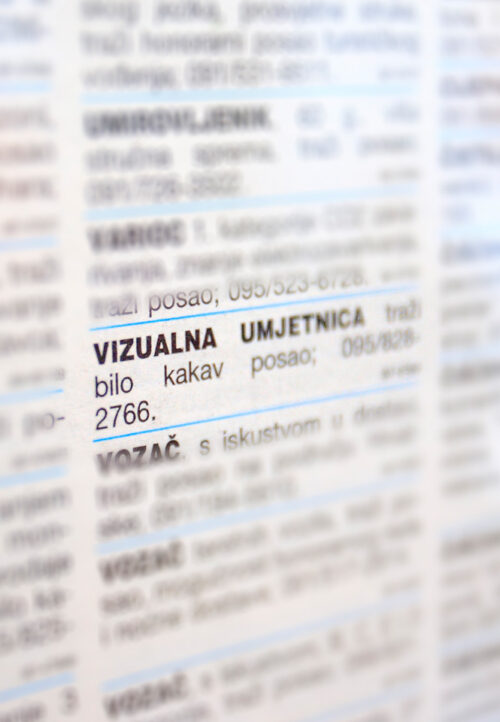Milijana Babić – Looking for Work
13.9.–7.10.2012.

Milijana Babić’s new project Looking for Work has been created over the past year and a half. In a broad sense, it examines the circumstances in the Croatian labour market, but in literal sense it is a search for employment. It starts with an advertisement in a newspaper: Visual artist urgently seeking any kind of work.
The ad was being published, on and off, in the local classifieds from January 2011 to July 2012. The ad highlights two things: the job is sought by a visual artist, and the “matter” is urgent. The project announces the positioning of art as a job in labour market, but it also introduces a more general concept of work, and these two ideas are interrelated. The information that a visual artist looks for any kind of work has drawn all sorts of offers, but without any real professional interest. In other words, it has mainly resulted in sexual proposals and other peculiar messages. Moreover, people seem to view age and gender as the most important qualifications for the job. Throughout this project, Babić did many jobs that were humiliating in terms of working conditions, earnings, and the attitudes towards female workers. She was working as a product promotor in a local mall, cleaner in commercial and residential buildings, leaflet distributor in different neighbourhoods of the city… Telephone conversations, job interviews, as well as the jobs she accepted, are all documented in audio, photo and video material, which would be presented at the exhibition.
Looking for Work reflects the state of the Croatian labor market, assuming the form of a first-person speech. By putting herself out there, Milijana Babić challenges the uncontrolled conditions, collecting a first-hand experience. Her body becomes an image of labor and gender relations, and a medium of expressing the ruthlessness of the economic principle. Babić speaks openly about the uncertain fate of a large part of the population, who have to put up with “flexible” working conditions, with no prospect of permanent employment, regular working hours, adequate reward and workers’ rights. At the same time, the project draws attention to the disregarded topic of contemporary Croatian artists who face existential threat, as their survival in the profession primarily relies on external sources of income. It examines the non-responding areas of the art system, with its rarely revealed and discussed issues, the irregularities and inertia in art institutions, and the frustrating effects of waiting and postponing any form action. The position of artists is described in the context of insufficient funds for art production, with rare opportunities for selling the artwork and questionable earnings, but also in the context of settling to these conditions. At the same time, the project also tackles the issue of how people perceive contemporary art? What do we mean by this term? What does it mean to be a contemporary artist in Croatia? Where and in what way is the contemporary artist visible and present? This torrent of questions does not refer only to the domain of art. By offering insights into the everyday life of poor and unprivileged groups, Babić points to different structures of oppression, as well as the dubious ways of survival in a capital-controlled society.
In our conversation with the artist, we will find out more about her motivation for the project and the ways she carried it out. Milijana Babić will talk about her experience as a waitress, cleaner, exhibition guard – a workforce member and a second-class citizen. Part of the talk will focus on the reasons that motivate Babić to take up such radical expression, posing the question of whether it is possible to encourage changes in thinking about social relationships. Finally, the talk will provide an opportunity to discuss the conditions in contemporary art production, and examine the ways of gaining public attention and the ways in which people see artists in general.
Milijana Babić (1974) lives and works in Rijeka. She graduated in 2002 from the Department of Fine Arts at the Durban Institute of Technology, Durban, South Africa, and received her master’s degree in 2007 from the Academy of Fine Arts and Design, Ljubljana. She is a longtime associate of the International Festival of Contemporary Art – Mesto žensk in Ljubljana. Babić is also an external associate at the Department of Sculpting at the Academy of Applied Arts in Rijeka. She is a member of the Croatian Association of Independent Artists. Milijana has presented her work at exhibitions in Croatia and abroad.
Catalogue design: Mario Aničić
Exhibition opening: Thursday, 13 /9/ 2012 at 8 pm
Artist talk: Thursday, 20/9 at 6 pm